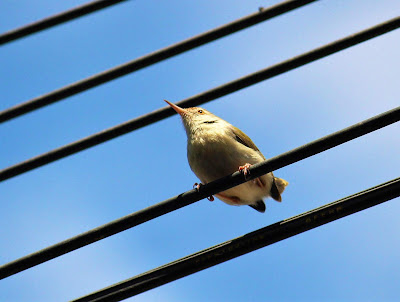Right so, we've all seen Purple Swamphen moving around, making short desperate flights that seem to be more leaps of faith than flights in the true sense. Looking at these rather colourful birds, one can never stop wondering why they have been called 'hens' rather than egrets or even or pheasants! I wouldn't really call them ducks because they certainly don't have webbed feet or I would have called them Cormorants!
There is a saying in India that the stately and regal Peacock cries out aloud in grief when he looks down at his feet. He cries out, "Why, why, O Lord, have you given me such ugly feet, I who am the most handsome and regal of all birds!" The answer surely would have been, " I had to give you the ugliest of feet to bring you down from your high throne of pride and vanity, Son!" The Purple Swamphen has the ugliest feet of any bird that I have ever seen! Its claws seem to have sprouted some sort weird appendages that seem somehow to be proportionately bigger than the rest of the body.
The Purple Swamphens, however, are the amongst the most beautiful birds I have come across to now (Beyond and above its legs, of course!). The shimmering purple-blue feathers of its body contrast quite well with its rather garishly red crown. The rich colours of its feathers, along with its bright red crop are often too distracting for the autofocus of one's camera to really lock in. Like the Peacock, (though less loud) the Purple Swamphen has an equally grating harsh call, rather like a trumpet gone bad. When startled, the bird makes a short trumpet squeak before it makes its Dash to safety.
From what I have observed so far is that Purple Swamphen are terrestrial birds with limited ability to fly. They can be found in swamps, marshes and wetlands. I have been observing Purple Swamphen at the Basai Wetland in Gurgaon for more than two years now and have come to realise that the bird population has been declining steadily. One of the major reasons for the declining number of Swamphen is the steady reduction in the size of the wetland thanks to the draining out of the water, filling up of the shallow areas with sand, debris and mud, and last but not least, the competition for food presented by the ever-increasing numbers of kites in the vicinity. The cultivation of the African Catfish in the adjacent ponds fed by the drained water of the wetland has been turned into big money. Carcasses and offal of gutted catfish left in the open have attracted kites that have in turn put excess burden on the resources available in the area.
Soon, the Swamphen will have been forced into extinction even as ugly concrete structures rise from the bed of the Wetland. Till then I guess we might have to make do with the few photographs that we have of this uniquely beautiful bird. Unlike Coots and Moorhen, Purple Swamphen seem to be tethered to the habitats they have grown up in. Their limited mobility and the rather strange shape of their feet could mean that the Purple Swamphen will probably not be able to migrate to other habitats before the bulldozers arrive to crush their nests under tonnes of sand and mud. That Purple Swamphen build their nests on weeds and mounds just above the water level becomes evident the moment we observe their nest-building activities.


















